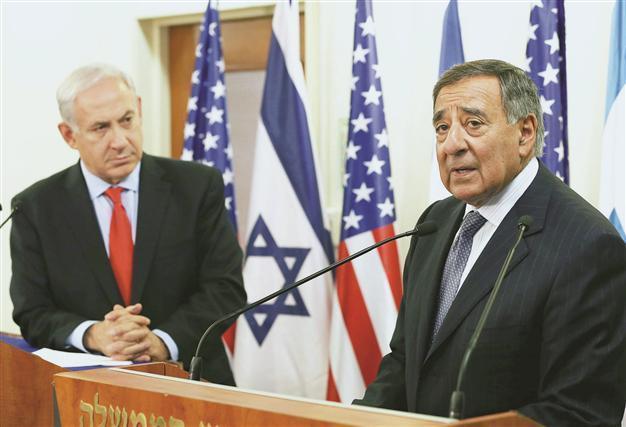US and Israel spar on dealing with Tehran’s nuclear drive
JERUSALEM

Israeli Prime Minister Benjamin Netanyahu (L) and US Defense Secretary Leon Panetta participates in a joint news conference at the Prime Ministers office in Jerusalem. AP photo
Israeli Prime Minister Benjamin Netanyahu said Aug. 1 without qualification that international economic sanctions have had no effect on Iran’s nuclear program and suggested Israeli patience was wearing thin, a statement that amounted to an indictment of President Barack Obama’s policy toward the Islamic republic.
Netanyahu dismissed U.S. Defense Secretary Leon Panetta’s assurances that the United States shared its goal of a non-nuclear Iran, saying the central features of Washington’s strategy for stopping the Islamic republic’s nuclear ambitions, sanctions and diplomacy, were perilously close to failure.
Netanyahu did not explicitly threaten to attack Iran, but that was the unspoken implication of his assertion that all non-military measures have proven ineffective in persuading Iran to change its course.
“Right now the Iranian regime believes that the international community does not have the will to stop its nuclear program,” the Associated Press quoted Netanyahu as saying. “This must change, and it must change quickly because time to resolve this issue peacefully is running out.” His message was particularly striking, given that he delivered it beside Panetta, who spent two days in Israel offering reassurances that the two allies shared the same goals on Iran.
‘Same statements few months ago’“I want to reassert again the position of the United States that with regards to Iran, we will not allow Iran to develop a nuclear weapon,” the Pentagon chief said. “We will not allow them to develop a nuclear weapon. And we will exert all options in the effort to ensure that that does not happen.”
Panetta argued that all non-military means of pressuring Iran must first be exhausted before military action is called for. He said repeatedly that Washington still considers military action an option for the future. But Netanyahu was unyielding in his view that more must be done now. He said sanctions have hurt Iran’s economy but not achieved their ultimate purpose, which is to change the calculus of Iran’s rulers. “Neither sanctions nor diplomacy has yet had any impact on Iran’s nuclear weapons program,” the Israeli leader said. “America and Israel have also made clear that all options are on the table.
New sanctionsYou yourself said a few months ago that when all else fails, America will act,” he said, referring to statements by Panetta. “But these declarations have also not yet convinced the Iranians to stop their program.” After Netanyahu’s comments, the White House insisted sanctions against Iran were having a “significant” impact. President Barack Obama’s spokesman Jay Carney said Iran had “yet to make the choice it needs to make, which is to abandon its nuclear weapons ambitions.”
“We completely agree with the prime minister’s assessment that Iran has failed to make that choice and that is absolutely a disappointment,” Carney said, aboard Air Force One. He added however that sanctions were having “a significant effect on the Iranian economy.” By the time Panetta is visiting Israel, U.S. Congress voted to slap sanctions on Iran’s energy, shipping and financial industries. The House overwhelmingly passed the bill 421-6 and a short time later, the Senate approved it by voice vote. The measure now heads to President Barack Obama for his expected signature.
The legislation would impose sanctions on anyone who mines uranium with Iran; sells, leases or provides oil tankers to Tehran; or provides insurance to the National Iranian Tanker Co., the state-run shipping line.
